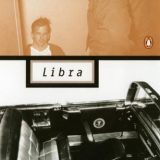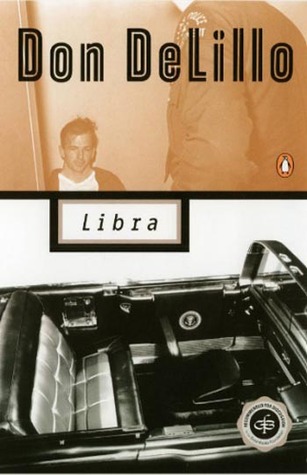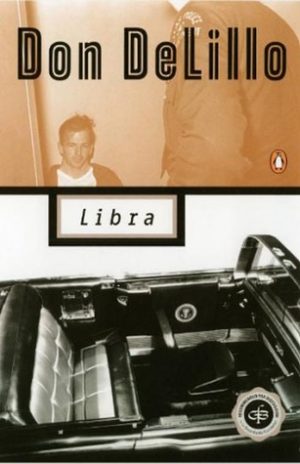Libra – Don DeLillo – 1988
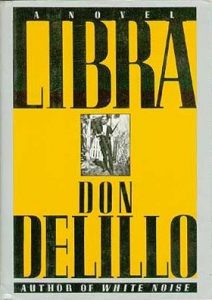
Reviewed by: Geoffrey Fox www.geoffreyfox.com Date: 20 January 2003
DeLillo, Don. Libra. New York: Viking, 1988. 458
Like La Fiesta del Chivo, Libra is a chillingly realistic novel that re-imagines and reconstructs a famous magnicide. But the more mysterious circumstances of the assassination of John F. Kennedy, and the particular obsessions of Don DeLillo, make this a very different book from Vargas Llosa’s telling of the killing of Rafael Trujillo.
According to DeLillo (through his stand-in character, Nicholas Branch),”the conspiracy against the President was a rambling affair that succeeded in the short term due mainly to chance.” Many people with different motives were out to get Kennedy from right-wing Aryan-nation types to non-ideological drifters desperate to leave a mark on history but (in this version) the most systematic pursuers were people who blamed him for the “loss” of Cuba and thought that his elimination would help them get that country back. These included embittered CIA cast-offs, mobsters, investors, and Cuban exile terrorists. You get the impression that even if they’d missed in Dallas, somebody was going to get JFK as long as he insisted on riding in an open car.
DeLillo is fascinated by the narratives we make up to explain ourselves and the world around us. Mostly he is fascinated by those with the weirdest and most complicated narratives, narratives that need frequent adjustment because they keep bumping into contradictory realities. Lee Oswald struggles to persuade himself that he is on to some secret understanding of the world, gained from laborious reading (because he’s dyslexic). Jack Ruby has convinced himself that he must always be a defender of the Jews and works very hard to silence his own suspicions that he may be homosexual. The rogue ex-CIA men, outwardly very calm, have an absolutely loony interpretation of history and their role in it. The most sensible character is Marina, Oswald’s Russian wife, who can’t take seriously any of her husband’s elaborate poses and just wants him to teach her English and help her and their baby daughters survive in what for her is a strange new world.
DeLillo has a very great novelistic strength that Vargas Llosa also exhibits (though more in the Peruvian novels than in Chivo): pitch-perfect dialogue. Ruby’s scenes are the best. He is a club owner, big spending and always on the brink of bankruptcy. His conversations with himself, his strip-teasers, a mobster associate from whom he’s seeking a loan, his feckless male roommate, and the cops he loves (he’s always taking them big, cholesterol-laden sandwiches) are hilarious, fragmented, contradictory, and utterly believable. In fact, my one complaint about the book is that we have to wait too long for Ruby to appear. Here’s a sample, from his meeting with Tony Astorina, chauffeur for the mobster:
“Jack, I come by here for old time.”
“We used to swim on the Capri roof.”
“I’m saying. I didn’t come by for the coffee.”
“Tony. I appreciate.”
“I come by because we go back together.”
“We got laid in adjoining rooms.”
“Havana, madonn’.”
–Etc. It’s wonderful.
We can’t know whether or to what extent DeLillo’s reconstruction of the messy, haphazard but ultimately successful plot to kill President John F. Kennedy is accurate, but it certainly is plausible. And it does create a coherent narrative that DeLillo offers as a “refuge,” “away of thinking about the assassination without being constrained by half-facts or overwhelmed by possibilities, by the tide of speculation that widens with the years.” (Author’s Note, at end of book)
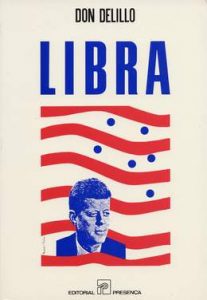
Reviewed by: Bill Stratton Date: 17 September 2002
On the surface Libra is a novel about the history of the assassination of President John Kennedy and an insightful narrative about the man who is said to have pulled the trigger: Lee Harvey Oswald. But as with all such histories, the seemingly clear surfaces merely reflect the latest scribbling on what is really a deeply inscribed palimpsest of human chronicle. Based on years of painstaking research Libra is an insightful study of Oswald and one of the most traumatic events in US history. Written from the perspective of a CIA historian assigned to produce a complete and secret history of the event, Don Delillo gives an intimate and multifaceted look at the man who has since become the symbol for America’s shattered dreams and the subject of countless conspiracy theory scenarios. In so doing Delillo has produced an image of Oswald that transcends the simplistic tropes to which he has been so often cast and, instead, strives to present Oswald as he really was: a lonely, impressionable, self-contradictory young man with a identity fractured by the contradictions of modernity—a man torn between the emptiness of the American dream and the glory of revolution.
In Libra, Oswald is not only the small meek looking man gunned down by Jack Ruby as a stunned nation was instantaneously transformed into subjects of the media panopticon, but also a dedicated Marxist, a US Marine, a husband, father and son. In Delillo’s narrative Oswald is given what most assassins are not: a human face, if not a multitude of them. As the story progresses, Oswald’s multiplicitous character is transformed and molded from “mere pocket litter”, a “cardboard cutout” into the ready-made villain of a fading American ideal. How this transformation is accomplished, rather than the result of Oswald’s actions, is really what Delillo is trying to find an answer for. Whether or not he succeeds in uncovering this depends upon the value that is given to history in modern society, and the implicit logic that this type of epistemological inquiry anticipates.
In Libra history is not simply an objective accounting of human accomplishment and action, but something constructed by “men in small rooms”. Libra is about understanding the influence of the apathetic forces of chance, randomness and cosmic disorder, which are then transformed into simplistic, seemingly seamless narratives that allow us all to sleep at night.
Libra is a book for anyone who wonders about the substance of American history and the ways in which this substance is created. It is a novel that throws into question many of our most cherished truths, one that requires the re-examination of the notions of human agency, identity, fate and ultimate nature of our postmodern reality. Libra is an exemplary novel that offers many insightful answers as well as being a highly readable and engaging work of contemporary American fiction.


